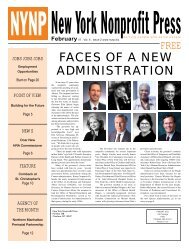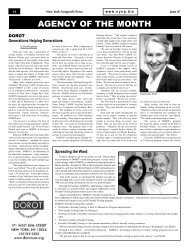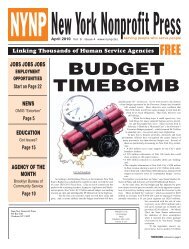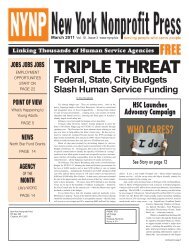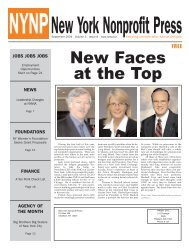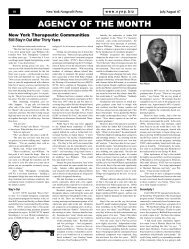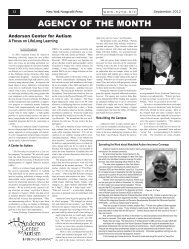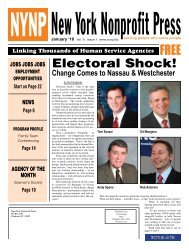Jewish Board of Family and Children's Services - New York ...
Jewish Board of Family and Children's Services - New York ...
Jewish Board of Family and Children's Services - New York ...
Create successful ePaper yourself
Turn your PDF publications into a flip-book with our unique Google optimized e-Paper software.
10 <strong>New</strong> <strong>York</strong> Nonpr<strong>of</strong>it Press www.nynp.biz March 07<br />
AGENCY OF THE MONTH<br />
<strong>Jewish</strong> <strong>Board</strong> <strong>of</strong> <strong>Family</strong> <strong>and</strong> Children’s <strong>Services</strong><br />
Advancing St<strong>and</strong>ards <strong>of</strong> Practice for 130 Years<br />
With more than 185 individual programs,<br />
over 2,800 full <strong>and</strong> part time employees <strong>and</strong><br />
a $175 million budget, the <strong>Jewish</strong> <strong>Board</strong> <strong>of</strong><br />
<strong>Family</strong> <strong>and</strong> Children’s <strong>Services</strong> is one <strong>of</strong> <strong>New</strong><br />
<strong>York</strong>’s largest human service organizations. It<br />
touches the lives <strong>of</strong> 65,000 people each year.<br />
Yet in many ways the <strong>Jewish</strong> <strong>Board</strong> is larger<br />
still. Its commitment to pr<strong>of</strong>essionalism, training<br />
<strong>and</strong> the highest quality care <strong>and</strong> treatment<br />
have helped to advance st<strong>and</strong>ards <strong>of</strong> practice<br />
for the entire field. JBFCS is an active advocate,<br />
both as a coalition partner in the struggle<br />
to improve services <strong>and</strong> as an individual agency<br />
bringing its reputation <strong>and</strong> prestige to bear on<br />
behalf <strong>of</strong> the sector as a whole. “It is our contribution<br />
to the field” is a comment one hears<br />
frequently from people at all levels within the<br />
JBFCS. It is a testament to their pride in the<br />
<strong>Jewish</strong> <strong>Board</strong>’s place <strong>and</strong> the responsibilities<br />
that position entails.<br />
JBFCS traces its history back more than<br />
130 years to the founding <strong>of</strong> United Hebrew<br />
Charities (UHC) in 1874 <strong>and</strong> the <strong>Jewish</strong> Prisoners<br />
Aid Society (JPAS) in 1893. UHC was<br />
created to coordinate the work <strong>of</strong> smaller <strong>Jewish</strong><br />
charities <strong>and</strong> by 1899 its women physicians<br />
were delivering as many as 900 babies at home<br />
each year. JPAS began serving adult prisoners<br />
<strong>and</strong> their familes <strong>and</strong> exp<strong>and</strong>ed to serve delinquent<br />
boys, founding the Hawthorne School in<br />
Westchester in 1906. Over time, these two organizations<br />
would continue to grow <strong>and</strong> evolve,<br />
eventually becoming <strong>Jewish</strong> <strong>Family</strong> Service <strong>and</strong><br />
the <strong>Jewish</strong> <strong>Board</strong> <strong>of</strong> Guardians. Their merger in<br />
1978 created the <strong>Jewish</strong> <strong>Board</strong> <strong>of</strong> <strong>Family</strong> <strong>and</strong><br />
Children’s <strong>Services</strong>.<br />
Today, JFBCS’ programs meet an extremely<br />
broad spectrum <strong>of</strong> individual needs.<br />
It provides services for the adult mentally<br />
ill, adolescent services including substance<br />
abuse treatment, early child development <strong>and</strong><br />
children’s day treatment programs, children’s<br />
residential treatment, community counseling,<br />
family violence programs, preventive services,<br />
refugee assistance, <strong>Jewish</strong> community services<br />
<strong>and</strong> much, much more.<br />
There is, however, a consistent theme.<br />
“Our core competency is mental health,” says<br />
Alan Siskind, Ph.D., who has led the organization<br />
as Executive Vice President <strong>and</strong> CEO since<br />
1991. “While we <strong>of</strong>fer a number <strong>of</strong> different<br />
services, all <strong>of</strong> our programs are informed by<br />
our mental health expertise. Everybody who<br />
comes to us gets an assessment so we can underst<strong>and</strong><br />
what they need <strong>and</strong> we develop a treatment<br />
plan based on their own lives <strong>and</strong> needs.”<br />
Gateways to Service<br />
“We are a large gateway for people who<br />
have a full range <strong>of</strong> human service problems,”<br />
says Paul Levine, Associate Executive Vice<br />
President, who will succeed Siskind upon his<br />
retirement in October. “We have 12 mental<br />
health clinics in the five boroughs. We also<br />
have a large array <strong>of</strong> <strong>of</strong>fsite consultants who<br />
work on-site in many synagogues <strong>and</strong> other<br />
community settings to give people who need<br />
help access through their local institutions<br />
where they are comfortable.”<br />
This network <strong>of</strong> community programs<br />
serves a broad sweep <strong>of</strong> <strong>New</strong> <strong>York</strong>ers. “Mental<br />
health is about all <strong>of</strong> us,” says Siskind. “We all<br />
exist on a continuum with mental health, just as<br />
we do with our physical health. Sometimes we<br />
are doing better on the continuum than other<br />
times. But I never met a single soul in my life<br />
who couldn’t benefit from knowledgeable support<br />
at some point.”<br />
“We are the place you come to if you are<br />
dealing with depression or you have a child<br />
who is not doing well,” says Levine. “We serve<br />
people from all socioeconomic groups.. There<br />
aren’t many providers out there doing this.”<br />
The <strong>Jewish</strong> <strong>Board</strong>’s Center for Child Development<br />
<strong>and</strong> Learning is another frontline resource<br />
for parents seeking help for young children<br />
struggling with a range <strong>of</strong> problems. The<br />
Center, which operates out <strong>of</strong> locations in Manhattan,<br />
Bronx, Brooklyn <strong>and</strong> Queens, provides<br />
comprehensive assessments <strong>and</strong> center-based<br />
therapeutic educational programs for preschool<br />
<strong>and</strong> younger children as well as community<br />
<strong>and</strong> school-based services for preschool <strong>and</strong><br />
school-aged children. The Louise <strong>and</strong> Henry<br />
Loeb Therapeutic Nursery School <strong>and</strong> clinc, located<br />
at JBFCS’ 57th Street headquarters building,<br />
serves 100 3-5 year olds <strong>and</strong> their families.<br />
The Special Education Itinerant Teacher<br />
(SEIT) Program allows pre-school children to<br />
remain in their own mainstream nursery classroom<br />
through the provision <strong>of</strong> direct one-onone<br />
work with the child <strong>and</strong> close consultation<br />
with the child’s teachers <strong>and</strong> parents.<br />
Meeting Extreme Needs<br />
While the <strong>Jewish</strong> <strong>Board</strong>’s community programs<br />
attract a wide range <strong>of</strong> clients, the agency<br />
also specializes in serving those with the most<br />
serious mental health problems. “JBFCS has<br />
services for certain populations with extreme<br />
needs – very disabled populations, people who<br />
have already experienced multiple psychiatric<br />
hospitalizations, young children with pervasive<br />
developmental disabilities,” says Levine. “I<br />
see that as a core for this agency, caring for the<br />
most disturbed kids, the most troubled adolescents,<br />
the most pr<strong>of</strong>oundly disabled.”<br />
This philosophy, for example, explains<br />
JBFCS’ work involving family violence, says<br />
Levine. The agency operates three domestic<br />
violence shelters accommodating a total <strong>of</strong> 171<br />
women <strong>and</strong> families, an advocacy program,<br />
<strong>and</strong> outreach services. “We run domestic violence<br />
shelters because those families are probably<br />
the most challenged families in the city,”<br />
says Levine. “Not only are they experiencing<br />
all kinds <strong>of</strong> issues related to family functioning<br />
<strong>and</strong> <strong>of</strong>ten mental health <strong>and</strong> substance abuse issues<br />
but they are also bruised <strong>and</strong> battered <strong>and</strong><br />
their lives are at risk.”<br />
Residential treatment for troubled youth<br />
falls into the same category. “Residential treatment<br />
is for those kids who are at the furthest<br />
end on the spectrum <strong>of</strong> need <strong>and</strong> we have some<br />
real capacity to do effective work there,” says<br />
Levine.<br />
JBFCS has <strong>of</strong>fered residential youth programs<br />
for a full century, beginning with the<br />
Hawthorne School in Westchester. Today, that<br />
same 100 plus-acre campus houses three separate<br />
residential programs. The Hawthorne Cedar<br />
Knolls Residential Treatment Center (RTC)<br />
serves 104 boys <strong>and</strong> girls aged 9 to 18. Two<br />
Office <strong>of</strong> Mental Health-licensed Residential<br />
Treatment Facilities (RTFs) are also located<br />
there: Linden Hill School, a 55-bed co-ed RTF,<br />
<strong>and</strong> the Jerome M. Goldsmith Center for Adolescent<br />
Treatment for 40 boys.<br />
The agency’s other children’s residential<br />
programs include Geller House, the Henry<br />
Ittleson Center, Kaplan House <strong>and</strong> the Mt. Vernon<br />
Girl’s Residence.<br />
Treating Trauma<br />
While the <strong>Jewish</strong> <strong>Board</strong> may have a long<br />
history <strong>of</strong> providing residential care, it has not<br />
allowed itself to be bound by tradition. Over<br />
the past decade, the agency has almost completely<br />
redesigned its approach to treating the<br />
needs <strong>of</strong> its young clients.<br />
During the 1990s, JBFCS’ Chief Psychia-<br />
A Commitment to Undoing Racism<br />
Alan Siskind, Ph.D.<br />
Paul Levine<br />
trist Dr. Robert Abramovitz began exploring<br />
the relationship between trauma <strong>and</strong> the problems<br />
confronting many <strong>of</strong> its clients. “Bob<br />
found that there were histories <strong>of</strong> trauma in a<br />
very high percentage <strong>of</strong> cases, both adults <strong>and</strong><br />
kids,” says Levine.<br />
At first glance, the <strong>Jewish</strong> <strong>Board</strong> <strong>of</strong> <strong>Family</strong> <strong>and</strong> Children’s<br />
<strong>Services</strong> (JBFCS) seems an unlikely organization to take on<br />
the fight against institutional racism. Yet, as with its focus on<br />
trauma, JBFCS has come to see Undoing Racism as a defining<br />
aspect <strong>of</strong> its culture <strong>and</strong> the services it provides.<br />
“The goal is to make sure our clients <strong>of</strong> color are getting<br />
the best possible care <strong>and</strong> we think that doesn’t happen if an<br />
organization doesn’t look at its own issues <strong>of</strong> race,” says Alan<br />
Siskind, Ph.D., JBFCS’ Executive Vice President <strong>and</strong> CEO.<br />
JBFCS has drawn upon the Undoing Racism work <strong>of</strong> the People’s<br />
Institute for Survival <strong>and</strong> Beyond to help it underst<strong>and</strong> the<br />
ways in which institutional racism impacts society in general<br />
<strong>and</strong> the social service system’s own efforts to assist clients.<br />
“It has become clear that you can have very good intentions<br />
about sensitive <strong>and</strong> culturally competent practice but unless you look at the issues that get in the<br />
way, you may not be able to deliver on those good intentions,” says Siskind.<br />
“You can’t claim clinical excellence <strong>and</strong> culturally competent practice without underst<strong>and</strong>ing<br />
race <strong>and</strong> racism,” says Mary Pender Greene, Chief <strong>of</strong> Social Work <strong>Services</strong>.<br />
As with its earlier trauma work, JBFCS has utilized its Scholars-in-Residence program to<br />
help move the Anti-Racism agenda. The last two Cohen Chairs have been occupied by experts in<br />
institutional racism – Dr. Ken Hardy <strong>and</strong> Drs. Nancy Boyd <strong>and</strong> A.J. Franklyn. David Billings <strong>of</strong> the<br />
People’s Institute has occupied the Pauline Falk Chair in Community Education <strong>and</strong> Research.<br />
“We m<strong>and</strong>ate that all our middle managers attend People’s Institute’s Undoing Racism workshops,”<br />
says Associate Executive Vice President, Paul Levine. “Eighty have to attend <strong>and</strong> close<br />
to sixty have already gone, many <strong>of</strong> us a couple <strong>of</strong> times.”<br />
In early February, JBFCS celebrated the publication <strong>of</strong> “Racism <strong>and</strong> Racial Identity: Reflections<br />
on Urban Practice in Mental Health <strong>and</strong> Social <strong>Services</strong>”. Edited by Lisz V. Blitz, Ph.D.,<br />
JBFCS’ Genesis Domestic Violence Shelter, <strong>and</strong> Pender Greene, the work includes chapters by<br />
many JBFCS staff examining the role <strong>of</strong> race <strong>and</strong> racism in social work practice.
March 07 <strong>New</strong> <strong>York</strong> Nonpr<strong>of</strong>it Press www.nynp.biz 11<br />
AGENCY OF THE MONTH<br />
Excellence Through Training <strong>and</strong> Education<br />
The <strong>Jewish</strong> <strong>Board</strong>’s commitment to staff development <strong>and</strong> in-service training is renowned<br />
throughout the local human services community. Employees at all levels are <strong>of</strong>fered a broad<br />
range <strong>of</strong> opportunities to advance their skills <strong>and</strong> their careers.<br />
“Training is a signature <strong>of</strong> the agency,” says Siskind. “It obviously has an important impact<br />
on quality. It is a risk management tool. It also is important for staff recruitment <strong>and</strong> retention.”<br />
“I think it is one <strong>of</strong> the things that makes it attractive to work here,” says Levine.<br />
The Martha K. Selig Educational Institute, JBFCS’ umbrella for all training activity, is a veritable<br />
university <strong>of</strong> training opportunities. Chartered by the <strong>New</strong> <strong>York</strong> State <strong>Board</strong> <strong>of</strong> Regents,<br />
its 32-page catalogue features everything from one-day workshops in treatment techniques,<br />
casework documentation, supervision <strong>and</strong> management to three-day certificate courses <strong>and</strong><br />
two-year Advanced Training Programs in Child, <strong>Family</strong> <strong>and</strong> Group Psychotherapy.<br />
Twice a year, all JBFCS pr<strong>of</strong>essional staff can take a full week’s worth <strong>of</strong> courses, broken<br />
up into one-day sessions over a five week period. “That is our bread <strong>and</strong> butter in-house training,”<br />
says Levine. “We also have advanced training. People who have been with us three or<br />
four years <strong>and</strong> want to develop a specialization in child/family treatment can take a two-year<br />
program. They give a half-day <strong>and</strong> we give a half day.”<br />
Specialized training programs are <strong>of</strong>fered by JBFCS’ array <strong>of</strong> in-house institutes: the<br />
Adult Milieu <strong>Services</strong> Training Institue, American Mental Health <strong>Services</strong> <strong>and</strong> Education Center,<br />
Center for the Study <strong>of</strong> Social Work Practice, Institute for Child Care Pr<strong>of</strong>essionalization<br />
<strong>and</strong> Training, Institute for Infants, Children & Families; <strong>and</strong> the Mt. Sinai School <strong>of</strong> Medicine<br />
Partnership.<br />
“We have a 50 hour certificate program, Excellence in Child Care,” says Frank Delano,<br />
LMSW, Director <strong>of</strong> the Institute for Child Care Pr<strong>of</strong>essionalization <strong>and</strong> Training, part <strong>of</strong> JBFCS’<br />
ongoing effort to enhance the role <strong>of</strong> its direct care personnel in residential programs. The<br />
program features Cornell Therapeutic Crisis Intervention, basic child development, the ABCs<br />
<strong>of</strong> residential child care, cultural diversity, GLBT youth <strong>and</strong> using recreation as a therapeutic<br />
activity. A complimentary 60-hour program has been developed for child care supervisors. “It’s<br />
unique in the country,” says Delano. An endowment allows JBFCS to <strong>of</strong>fer $1,000 stipends to<br />
staff who complete the programs. “At this point, about 60 supervisors <strong>and</strong> over 100 child care<br />
workers have graduated,” says Delano.<br />
Supplementing these training courses are JBFCS’ leadership <strong>and</strong> mentoring programs<br />
designed to assist staff in better underst<strong>and</strong>ing the agency’s culture <strong>and</strong> broad array <strong>of</strong> service<br />
areas. “They bring together people from different parts <strong>of</strong> the agency,” says Mary Pender<br />
Green, Chief <strong>of</strong> Social Work <strong>Services</strong>. “They get to know each other <strong>and</strong> learn about programs<br />
in other parts <strong>of</strong> the agency.”<br />
“Once you think about this kid having had<br />
long term, extensive exposure to trauma, childhood<br />
sexual abuse <strong>and</strong> violence, there are certain<br />
things you can expect to see,” says Abramovitz.<br />
“If you don’t attend to those issues you are not<br />
going to succeed.” He estimates that 70% <strong>of</strong><br />
youth in residential programs have histories <strong>of</strong><br />
trauma.<br />
In typical fashion, however, JBFCS didn’t<br />
stop there.<br />
“Bob essentially defined the clinical<br />
theme for this agency,” says Levine. “We are<br />
fortunate enough to have an endowed chair,<br />
like at a university, through which we bring in<br />
top people in mental health to work with us on<br />
specific issues. The theme for the first several<br />
years <strong>of</strong> the Saul Z. Cohen Chair in Child <strong>and</strong><br />
<strong>Family</strong> Mental Health became trauma.”<br />
Bessel van der Kolk, MD, a pr<strong>of</strong>essor from<br />
Harvard, spent two years working with JBFCS<br />
on the physiological impact <strong>of</strong> trauma. “He<br />
helped us underst<strong>and</strong> that people needed to be<br />
helped to gain some control over their emotions<br />
before they could go back <strong>and</strong> solve the trauma<br />
issues in their lives,” says Levine.<br />
In 1998, S<strong>and</strong>ra Bloom, a psychiatrist<br />
from Philadelphia, began working with JFBCS<br />
to adapt her Sanctuary® model, a program that<br />
utilizes a therapeutic community approach to<br />
deal with client trauma, for use with adolescents.<br />
The <strong>Jewish</strong> <strong>Board</strong> began piloting the<br />
new approach at Hawthorne Cedar Knolls in<br />
1999 <strong>and</strong> has subsequently rolled it out for the<br />
entire Westchester campus.<br />
“We have found it extremely helpful,” says<br />
Lenny Rodriguez, JBFCS’ Assistant Executive<br />
Director <strong>and</strong> Director <strong>of</strong> Children’s Residential<br />
<strong>Services</strong>. “The Sanctuary® Model has helped<br />
us to reduce our level <strong>of</strong> incidents dramatically.”<br />
The program empowers youth to underst<strong>and</strong><br />
their own history <strong>of</strong> trauma <strong>and</strong> loss, develop<br />
personal safety plans for coping with emotional<br />
reactions to trauma-related events <strong>and</strong> envision<br />
a future better than their past. “Most <strong>of</strong> the kids<br />
here have experienced loss that is traumatic,”<br />
says Rodriguez. “They have lost a parent,<br />
been moved around from foster home to foster<br />
home.” Kids in the Sanctuary community learn<br />
to help each other in dealing with trauma <strong>and</strong><br />
safety issues – another vehicle for improving<br />
their own sense <strong>of</strong> mastery <strong>and</strong> control.<br />
The Sanctuary® Model also empowers<br />
JBFCS’ direct care staff to be what they already<br />
are – full fledged members <strong>of</strong> the therapeutic<br />
team. “We are developing new roles for the<br />
staff,” says Rodriguez. “They are moving away<br />
from behavior management <strong>and</strong> spending more<br />
time talking to the kids about trauma <strong>and</strong> safety<br />
plans. The kids come to them when they feel<br />
stressed.”<br />
The <strong>Jewish</strong> <strong>Board</strong>’s recognition <strong>of</strong> trauma<br />
as a widespread <strong>and</strong> fundamental cause <strong>of</strong><br />
many emotional <strong>and</strong> mental health problems<br />
now guides all <strong>of</strong> its treatment programs.<br />
Collaborations<br />
One new initiative highlights both JB-<br />
FCS’s trauma focus <strong>and</strong> its ability to bring<br />
mental health <strong>and</strong> programmatic expertise<br />
into partnerships with other service providers.<br />
Founded in 1906, JBFCS is celebrating the centennial <strong>of</strong> its Hawthorne Cedar Knolls Residential Treatment<br />
Center in Westchester.<br />
Child welfare agencies have long struggled<br />
to obtain mental health services for children<br />
in foster care. Simple referrals to community<br />
mental health programs <strong>of</strong>ten break down in<br />
the face <strong>of</strong> logistical obstacles -- missed appointments,<br />
emergency replacements, an inability<br />
to connect with family members. In<br />
response, JBFCS has piloted a new model<br />
which outposts JBFCS therapists full-time at<br />
foster care agencies where they can provide<br />
direct treatment for children living in foster<br />
boarding home programs.<br />
“We got funding from the Hasbro Children’s<br />
Fund, Ira W. DeCamp Foundation,<br />
Edward <strong>and</strong> Ellen Roche Relief Foundation<br />
<strong>and</strong> The Merrin Foundation to put therapists<br />
in two agencies for two years,” says Levine.<br />
The programs were piloted with Good Shepherd<br />
<strong>Services</strong> <strong>and</strong> Seamen’s Society for Children<br />
<strong>and</strong> Families. “It was a real partnership.<br />
Therapists <strong>of</strong>fered mental health training for<br />
foster parents <strong>and</strong> caseworkers. They began<br />
screening kids, consulting on cases, sitting in<br />
on permanency hearings <strong>and</strong> building caseloads.”<br />
The results have been impressive. “We<br />
cut the replacement rate from 25% to 9%.<br />
Basically, we did a lot <strong>of</strong> treatment <strong>and</strong> prevented<br />
the breakup <strong>of</strong> viable foster care arrangements,”<br />
says Levine. In some cases,<br />
the program also identified foster home situations<br />
that were not likely to have successful<br />
outcomes for the child, leading to replacement<br />
with more positive results.<br />
Now, the initiative is exp<strong>and</strong>ing with<br />
five other mental health providers applying<br />
for OMH approval to establish satellite <strong>of</strong>fices<br />
in foster care agencies. “The evidence that<br />
you can dramatically reduce re-placements is<br />
so tangible,” says Levine. “It translates into<br />
shorter lengths <strong>of</strong> stay in foster care. If you<br />
can get to work on the permanency plan in a<br />
stable environment, kids don’t have to stay<br />
as long.”<br />
Levine believes that there are many<br />
ways in which the <strong>Jewish</strong> <strong>Board</strong>’s expertise<br />
can help other service providers. “We have<br />
teams <strong>of</strong> staff located in every ACS field <strong>of</strong>fice<br />
in Brooklyn,” he says. “They have expertise<br />
in mental health, substance abuse <strong>and</strong> domestic<br />
violence to assist field <strong>of</strong>fice staff in<br />
making decisions about removals <strong>and</strong> service<br />
plans. It is a way for different organizations<br />
to sit down, roll up their sleeves <strong>and</strong> work<br />
together to solve problems. We would like to<br />
do a lot more <strong>of</strong> it.”<br />
The agency has begun working with outside<br />
organizations to provide trauma services<br />
in preparation for or in response to traumatic<br />
events. “We were recently called in to a private<br />
school where a student had died in an accident<br />
over the weekend,” says Levine. “We<br />
had five staff there Monday morning working<br />
with teachers <strong>and</strong> the other students.”<br />
JBFCS’ impressive array <strong>of</strong> training programs<br />
(See: box at left) is another way in which<br />
the agency shares its expertise with the broader<br />
nonpr<strong>of</strong>it community. Each year, more than<br />
1,000 staff from other agencies attend workshops<br />
or certificate courses at JBFCS’ Martha<br />
K. Selig Educational Institute. The <strong>Jewish</strong><br />
<strong>Board</strong>’s staff also take their training on the<br />
JBFCS continued on page 12<br />
Need Assistance in<br />
Audit Preparation,<br />
Plan <strong>of</strong> Corrective Actions,<br />
or Staff Development<br />
<strong>and</strong> Training?<br />
Beacon Therapy <strong>Services</strong> can<br />
assist you!<br />
Our consulting division<br />
can provide technical<br />
<strong>and</strong> regulatory<br />
expertise in the fields<br />
<strong>of</strong> nursing <strong>and</strong><br />
OMRDD.<br />
Beacon also <strong>of</strong>fers therapeutic services<br />
to a variety <strong>of</strong> populations in various<br />
settings. We specialize in Nursing,<br />
Nutrition, Social Work, Occupational,<br />
Physical, Speech Therapies, Psychology<br />
<strong>and</strong> Rehabilitation Counseling.<br />
“We are here to service<br />
the community.”<br />
Contact: Helen<br />
<strong>New</strong> Program Development<br />
(516) 625-6846, ext. 114
12 <strong>New</strong> <strong>York</strong> Nonpr<strong>of</strong>it Press www.nynp.biz March 07<br />
AGENCY OF THE MONTH<br />
JBFCS continued from page 11<br />
road, packaging specific workshops<br />
<strong>and</strong> coursework for on-site presentation<br />
at host agencies. The menu is<br />
tremendously varied. “We have been<br />
very active in <strong>of</strong>fering preparation<br />
courses for the social work licensing<br />
exams,” says Levine. At the far end <strong>of</strong><br />
the spectrum, <strong>Jewish</strong> <strong>Board</strong> staff train<br />
nursery school teachers to run a model<br />
<strong>of</strong> infant group therapy developed at<br />
JBFCS’ Institute for Infants, Children<br />
& Families. “They do it right their in<br />
the classrooms,” says Levine. “It is a<br />
way to work with these very young<br />
children who otherwise would be suspended<br />
from nursery school because<br />
they can’t manage their behavior.”<br />
Advocacy<br />
JBFCS has long been an active<br />
advocate on behalf <strong>of</strong> the human services sector<br />
<strong>and</strong> the clients it serves. “We put a lot <strong>of</strong><br />
effort into that,” says Levine. “We are very active<br />
in numerous coalitions.”<br />
Siskind served as president <strong>of</strong> the Human<br />
<strong>Services</strong> Council <strong>of</strong> <strong>New</strong> <strong>York</strong> City for<br />
several years during which that organization<br />
truly began to assert its role as a voice for all<br />
nonpr<strong>of</strong>it providers. “If we are unified, the<br />
human services sector is enormous. We can<br />
have tremendous influence,” he says. Siskind<br />
has also served as president <strong>of</strong> the Coalition <strong>of</strong><br />
Behavioral Health Agencies.<br />
JBFCS has also been exceptionally successful<br />
in mobilizing the passion <strong>of</strong> its board<br />
<strong>of</strong> directors as part <strong>of</strong> its advocacy effort. Each<br />
year, board members travel to Albany to meet<br />
with legislators, commissioners <strong>and</strong> staff from<br />
the governor’s <strong>of</strong>fice to outline the concerns<br />
<strong>and</strong> priorities. “They love it,” says Siskind. “It<br />
is very rewarding for them. They get to see the<br />
results <strong>of</strong> their work in a very concrete way.”<br />
“It is very effective to have lay people<br />
advocate for the agency,” says Levine, who<br />
credits the board’s efforts for helping to<br />
win the most recent clinic rate increase.<br />
“They get the ear <strong>of</strong> people in government<br />
who ordinarily would view agency<br />
executives as self-interested.”<br />
Philanthropic Support<br />
JBFCS’ board also has shown its<br />
courage by supporting the agency’s<br />
commitment to the highest quality<br />
st<strong>and</strong>ards <strong>of</strong> service in the face <strong>of</strong><br />
eroding levels <strong>of</strong> government support.<br />
Maintaining the agency’s “gateway”<br />
services, staff development programs<br />
<strong>and</strong> cutting edge therapeutic programs<br />
is not easy. Each year, JBFCS raises<br />
more than $7 million in private philanthropic<br />
support to supplement its budget.<br />
The clinics alone require $2.2 million,<br />
close to 10% <strong>of</strong> their total budget,<br />
in private monies. The long awaited<br />
increase in clinic reimbursement rates<br />
by OMH in 2005 barely dented this significant<br />
need for philanthropic support.<br />
“We have a very good board,” says Siskind.<br />
“They are very committed, hardworking, smart<br />
<strong>and</strong> generous.” Nevertheless, he acknowledges<br />
that it is always a challenge to raise money.<br />
“There is lots <strong>of</strong> competition,” says Siskind.<br />
“We are not only competing with our colleague<br />
agencies. We are competing with the Metropolitan<br />
Opera, the museums <strong>and</strong> all the other nonpr<strong>of</strong>its.<br />
UJA-Federation has been an enormous<br />
help to us. They have been a key to maintaining<br />
our quality <strong>of</strong> our agency.”<br />
Transition<br />
JBFCS’ leadership transition seems<br />
to be emblematic <strong>of</strong> its overall approach to<br />
management – carefully planned <strong>and</strong> well<br />
implemented. Siskind, who has overseen a<br />
three-fold-plus growth in the <strong>Jewish</strong> <strong>Board</strong>’s<br />
operations, from approximately $50 million<br />
in 1991 to $175 million this year, announced<br />
his plans to retire three years ago. Several<br />
months later, the <strong>Board</strong> designated Levine to<br />
be his successor.<br />
“Having the right person in house makes<br />
it so much smoother,” says Siskind. He <strong>and</strong><br />
Levine have worked together closely for<br />
years. “The day I started as Executive Vice<br />
President, I asked Paul to take on the role <strong>of</strong><br />
Associate Executive Vice President.”<br />
“Alan <strong>and</strong> I have been friends for 40<br />
years,” says Levine. “He is a very, very skilled<br />
executive. You couldn’t have a better person to<br />
work with during a process <strong>of</strong> transition.”<br />
Levine will take over full operating responsibility<br />
on July 1st <strong>and</strong> replace Siskind<br />
as CEO on October 1st.<br />
JBFCS is currently involved in a strategic<br />
planning process to outline goals <strong>and</strong> objectives<br />
for the next five years. Adapting to the<br />
changing needs <strong>and</strong> evolving demographics<br />
<strong>of</strong> <strong>New</strong> <strong>York</strong> City will be a major challenge.<br />
Both Siskind <strong>and</strong> Levine appear confident<br />
that the <strong>Jewish</strong> <strong>Board</strong>’s current strategy --<br />
being a leader in providing the highest quality<br />
services for people with complex mental<br />
health related needs – continues to be right<br />
for the future.<br />
A USTA EVENT<br />
Levy Restaurants is the<br />
food & beverage provider<br />
for the US OPEN<br />
at the USTA National<br />
Tennis Center.<br />
Become part <strong>of</strong> the team<br />
with Levy Restaurants<br />
at the USTA<br />
National Tennis Center!<br />
The ball is in<br />
your court!<br />
Great fundraising<br />
opportunities are<br />
waiting for you!<br />
Make a difference,<br />
One dollar at a time!<br />
We currently welcome<br />
NON-PROFIT<br />
ORGANIZATIONS<br />
the opportunity to raise<br />
money for their cause as<br />
we train them to run<br />
concession st<strong>and</strong>s <strong>and</strong>/or<br />
work as suite runners.<br />
A variety <strong>of</strong> shifts are<br />
available making it easy to<br />
work with your groups<br />
schedule! A minimum<br />
commitment <strong>of</strong> 1 week<br />
(7days <strong>of</strong> coverage)<br />
per group is required.<br />
If you are interested in more information,<br />
please contact Valerie at:<br />
718-595-1936<br />
vbaker@levyrestaurants.com<br />
www.levyrestaurants.com<br />
LevyRestaurants.com • EOE



